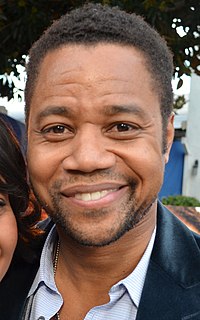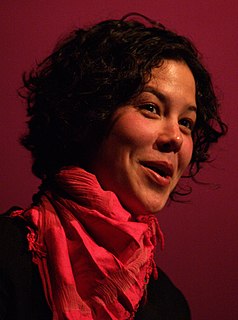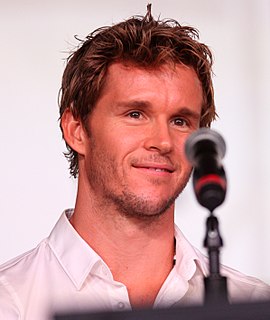A Quote by Cuba Gooding, Jr.
I think all my characters haunt me. Especially the real-life ones, like Master Chief Carl Brashear, the Tuskagee Airmen. Every time I see a military person, it gives me such a sense of pride but also a sense of responsibility to project excellence when representing them.
Related Quotes
Fragmentation is a big part of the problem. You have a city where trash is taken away from the curb every week, and you don't see it any more, and you don't have any sense of where water comes from. So there's no sense of responsibility and accountability and there's also no sense of empowerment for our actions.
There's definitely a sense of responsibility and it's something I take very seriously. It's an honor. There's pressure, but that's a good thing and something I feel very fortunate to have. I take great responsibility for it. Not every number gives you pressure. This number, the No. 3, means so much. It pushes me to be better, to go to the gym, to talk to my crew chief Gil Martin, and to be with the guys on the team every day. The number pushes me and that's a good thing.
Whatsoever accidents or qualities our senses make us think there be in the world, they are not there, but are seemings and apparitions only. The things that really are in the world without us, are those motions by which these seemings are caused. And this is the great deception of sense, which also is by sense to be corrected. For as sense telleth me, when I see directly, that the colour seemeth to be in the object; so also sense telleth me, when I see by reflection, that colour is not in the object.
I'm a representative of something that's greater than myself. When you see me out there on the track, I'm not just representing myself or my country, I'm representing Christ and what He's done through me. I have a responsibility to show His love and show others what He's done for me. It's also freed me up.
I do not at all believe in human freedom in the philosophical sense... Schopenhauer’s saying, ‘A man can do what he wants, but not will what he wants,’ has been a very real inspiration to me since my youth; it has been a continual consolation in the face of life’s hardships, my own and others’, and an unfailing wellspring of tolerance. This realization mercifully mitigates the easily paralyzing sense of responsibility and prevents us from taking ourselves and other people too seriously; it is conducive to a view of life which, in part, gives humour its due.
When you have any kind of success in life, that's like the most dangerous moment that you're in because you're going to tend to think wow, I can just keep repeating what I've done. I'm a great person. People love me. All of the sudden they're giving me all of this attention. You get drunk on it and you lose your sense of balance and your sense of detachment. I know it's happened to me.
I think, in terms of corporate philosophy, I've always believed that you've got to treat people in a very very egalitarian manner in the sense I like to treat people on a one-to-one basis. And I like people to take on a lot of responsibilities because I think with a sense of responsibility also comes a sense of purpose.
What I bring - my team and I, because it's not only me - is this sense of elegance and casualness, and no pretension. There's also a sense of loyalty - loyalty to my customers, but also loyalty from my staff. Also, I think a sense of perfection; I'm a bit of an obsessed freak with perfection. I think I bring craziness sometimes, because if there is someone who's going to dare do something crazy, it's me.
For me, the biggest thing I've learned is how to be myself and the fact that viewers actually want to feel like they're getting to know you as a person. They value you because you're a reporter and you're bringing them new information, but they also want to feel like they get a sense of your sense of humor and what things you're interested in.




































